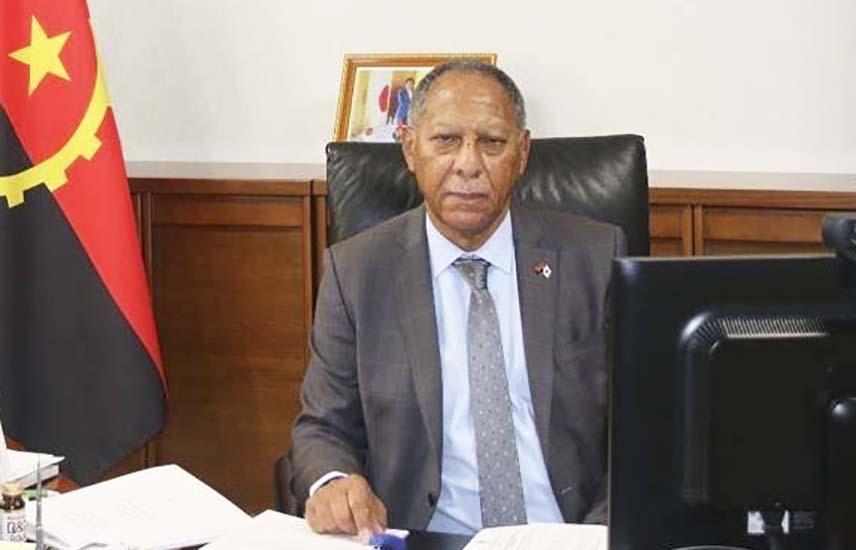Africa-Press – Angola. The Angolan ambassador to Japan, Rui Orlando Xavier, considers the cooperation relations between the two countries to be “good”, in the political and economic domain, and praises the Japanese effort in the demining process.
In an exclusive interview, within the framework of the official working visit that the Angolan Head of State, João Lourenço, will carry out in Japan, from the 12th to the 15th of the current month, the diplomat also spoke , of the volume of business between the two countries.
During the conversation, the ambassador, appointed by the President of the Republic in 2018, also addressed issues related to Japanese investments in Angola, the training of Angolan staff and demining, which, according to him, will help the country “to rid anti-personnel mines by 2025, with an impact on economic diversification and people’s security”.
Here is the full interview:
How do you assess the state of relations between Angola and Japan?
Rui Xavier (RX)- Relations between the two countries are considered good, both from a political and economic point of view.
As is known, relations date back to September 1976, with Angola opening its Embassy in Tokyo in November 2001, and four years later, Japan opened its diplomatic representation in Luanda.
Japan also opened the International Cooperation Agency (JICA) office in 2007 in the Angolan capital, Luanda.
What areas does the volume of business between the two countries affect?
RX -Trade in goods transacted between Angola and Japan represented US$108 million in exports and US$489 million in imports, in the period 2020-2022, corresponding to a negative balance of trade of around US$ 380 million.
Angola essentially exports fuel (crude oil, propane and butane) and, on the other hand, imports vehicles, auto parts, transport materials, machinery, appliances, plastics, rubber (tyres, rubber tubes), iron and steel.
Still in the framework of bilateral cooperation, is there already a date for the conclusion of the agreement on the liberalization and promotion of investments between the two States?
RX– There is still no date for the conclusion of this important agreement, but I can assure you that the Ministries of Foreign Affairs of Angola and of Foreign Affairs of Japan are working hard to finish it, very soon. Small details are missing, mainly in some attachments, to close the document. We are optimistic.
The diversification of the Angolan economy is one of the ‘flags’ of the Angolan Executive, led by President João Lourenço. In which sectors has the Japanese Government and businessmen shown more interest?
RX – The sectors of greatest interest expressed by Japanese businessmen focus on agriculture, energy and water, transport, mines, oil and gas.
And what about demining?
RX -Japan has been one of the few countries that has embraced this issue as its own. This process goes very well. Recently, another agreement was signed for non-reimbursable assistance in the field of mine clearance, in the approximate amount of 2.3 million US dollars.
This effort by Japan aims to help Angola get rid of anti-personnel mines by 2025, with an impact on economic diversification and people’s safety.
Since 1990, Japan has already implemented close to 74 projects in various areas, with the aim of directly benefiting local communities, through the basic regime for the Angolan Government.
Regarding cooperation in the field of staff training, do you have an estimate of the number of Angolans studying in Japan?
RX-AAngolan community in Japan is made up of 59 citizens, divided into diplomatic (19), resident and student (40) categories.
Most of the students are from the Ministries of Education, Culture, Science and Technology. There are others who study at the Japan International Cooperation Agency (JICA), attending graduate, masters and doctoral degrees.
Working citizens were, in the past, scholarship holders who chose to remain in Japan. There is even a citizen who is a Mathematics teacher, as well as others who have formed a family and are inserted in the job market.
As a general rule, there is excellent cohabitation between members of the diplomatic corps and the community, largely due to the various initiatives to include them in the various activities that are carried out at the embassy and at the official residence.
There is an Honorary Consulate, opened in 2021, which operates in Nagoya Prefecture, whose consul is Mr. Ichiro Kashitani, also president of Toyota Tsusho Corporation.
Could you tell us the specialties most done by Angolan students?
RX -Most scholarship holders attend courses in Exact Sciences, as well as in Communication and Information Technologies. One of the reasons why the number of scholarship holders is reduced is due to the poor training of students in basic and secondary education, in Exact Sciences and the English language.
This aspect happens especially when they are confronted in the first admission test, which is held at the Japanese Embassy in Luanda, and are then eliminated.
What can Angola expect more from the Government of Japan in terms of bilateral cooperation?
RX- Angola expects and desires greater and more concrete support in the economic, financial, as well as in the industrial and manufacturing sectors. The field is quite vast, because Japanese companies have a lot of quality and are very competent. In addition, in the post-conflict period, in the context of national reconstruction, Japan has carried out its bilateral assistance to Angola, through international organizations, efforts for national reconciliation, food aid, assistance to farmers, assistance with the repatriation of refugees , demining, water supply facilities, construction of primary schools, communication network and ports, with a focus on basic infrastructure.
As a final note, I would like to point out that, at the moment, Japan is implementing several projects in the sectors of Education, Public Administration, Labor and Social Security, Geology and Mines, Telecommunications, Information Technologies and Social Communication, Agriculture, Transport and Health, with emphasis on the upgrading of Namibe Bay and the commercial and mining ports of Sacomar.
Cooperation
Bilateral cooperation between Angola and Japan began in 1988, with emergency assistance through the United Nations International Children’s Fund (UNICEF).
After the end of the armed conflict, in 2002, as a result of the visit of the then Minister of Foreign Affairs, Yoriko Kawaguchi, a study mission was sent in February 2003 to support the establishment of peace, with Japan providing assistance areas for demining, as well as the reintegration and social reintegration of former soldiers and refugees.
In the health sector, in 1996, Japan donated US$40 million for the rehabilitation and equipment of the Josina Machel Hospital, one of the best in the country, as well as the application of human resources development for 750 technicians.
Within the scope of economic cooperation, in recent years, Japanese knowledge and experience has been used in the areas of rice cultivation development and professional training.
Currently, cooperation with Angola is based on three pillars: support for economic development (professional training, main infrastructure and agriculture), peacekeeping (social reintegration of former soldiers and refugees, demining and government management) and human security ( health, medicine and food).
Located in the Far East and known as the ‘Land of the Rising Sun’, Japan is made up of a mountainous archipelago, formed by the islands of Kyushu, Honishu, Honshi Shikoku and Hokkaido.
An island country in the Pacific Ocean, it has dense cities, imperial palaces, mountainous national parks, as well as thousands of shrines and temples.
ProfileAppointed in November 2018, he has already held the following positions: Director of the Directorate for Multilateral Affairs (Ministry of Foreign Affairs), head of the Department of the Special Agencies Division and Directorate for Multilateral Affairs, Minister-Counselor at the Embassy of Angola in Portugal, head of the Western Europe Department, as well as adviser to the Angolan Embassy in Italy.
Born on October 12, 1954, in Luanda, Rui Orlando Ferreira de Ceita da Silva Xavier has a degree (Autonomous University of Lisbon) and a master’s degree in International Relations. His service record also includes his duties as head of the Department of the former Organization of African Unity (OAU), now the African Union – AU (Africa and Middle-East Directorate) and of the Department of External Relations of the Ministry of Foreign Affairs (MIREX) of Angola.
For More News And Analysis About Angola Follow Africa-Press






